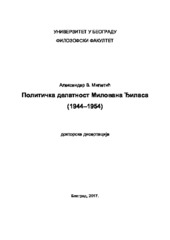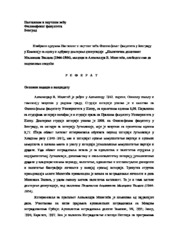Приказ основних података о дисертацији
Политичка делатност Милована Ђиласа: (1944-1955)
Political activities of Milovan Đilas: (1944-1955)
| dc.contributor.advisor | Dimić, Ljubodrag | |
| dc.contributor.other | Radojević, Mira | |
| dc.contributor.other | Terzić, Milan | |
| dc.contributor.other | Ristović, Milan | |
| dc.contributor.other | Životić, Aleksandar Ž. | |
| dc.creator | Miletić, Aleksandar | |
| dc.date.accessioned | 2018-12-26T14:30:09Z | |
| dc.date.available | 2018-12-26T14:30:09Z | |
| dc.date.available | 2020-07-03T10:05:27Z | |
| dc.date.issued | 2017-12-04 | |
| dc.identifier.uri | http://eteze.bg.ac.rs/application/showtheses?thesesId=6380 | |
| dc.identifier.uri | https://nardus.mpn.gov.rs/handle/123456789/10469 | |
| dc.identifier.uri | https://fedorabg.bg.ac.rs/fedora/get/o:19067/bdef:Content/download | |
| dc.identifier.uri | http://vbs.rs/scripts/cobiss?command=DISPLAY&base=70036&RID=529076887 | |
| dc.description.abstract | Милован Ђилас (1911–1995) био је јеадан од четворице највиших партијских и државних функционера послератне социјалистичке Југославије и касније једна од најкрупнијих дисидентских фигура, не само у југословенском контексту, већ и у оквиру Хладног рата. Предмет овога рада је део политичке биографије Милована Ђиласа, који обухвата период од 1944. до 1954. године, односно од прве дипломатске (војне) мисије у СССР-у до његовог пада са власти. Милован Ђилас је рођен у Подбишћу код Мојковца 1911. године. Члан Комунистичке партије Југославије постаје 1932. Од краја 30-их део је самог врха партијског вођства (''велика четворка''), поред Јосипа Броза Тита, Едварда Кардеља и Александра Ранковића. У рату и револуцији обављао је низ војних и политичких дужности. У процесу револуционарног освајања власти Милован Ђилас игра важну улогу, као и у процесу политичког обрачуна са остацима старог система. У процесу изградње нове државе, Милован Ђилас је задужен првенствено за област идеолошког и пропагандног рада, као и област културе и просвете. На спољнополитичком пољу, Ђилас је играо важну улогу од самог почетка стварања нове државе, од мисија у СССР-у до заступања Југославије у ОУН, преговора са Западом по питању наоружања и контаката са западноевропском левицом. Од 1950. Ђилас постепено гради свој идеолошки и политички концепт ''социјалистичке демократије'', активно учествује у афирамацији демократизације и либерализације друштва, што је у великој мери прихваћено као партијска ''линија'' на Шестом конгресу, 1952. После Стаљинове смрти, марта 1953, Ђилас одбија да се повинује новом политичком ''курсу'' и наставља са критиком. Током друге половине 1953. и почетком 1954. објављује серију чланака у листу Борба и Нова мисао, што га доводи у сукоб са остатком руководства, пре свега са Титом. На Трећем (ванредном) пленуму, јануара 1954. Милован Ђилас је оптужен за ''ревизионизам'' и смењен са свих партијских и државних функција и удаљен са власти. Период политичке биографије Милована Ђиласа који је предмет истраживања у великој мери је запостављен, како у науци тако и у публицистици. У њему се отвара важно, можда и кључно питање како је Милован Ђилас радикално променио своје становиште и од убеђеног стаљинисте постао отпадник комунистичког света. Поред тога, назначени период крије у себи више питања, почев од начина политичког обрачуна са старим системом, утицаја на идеолошко обликовање новог друштва, сукоба са СССР-ом, критике совјетског система, афирмације југословенског искуства и демократизације друштва, у чему је Ђилас имао запажену улогу. Такође, поставља се и важно питање обрачуна унутар југословенског руководства. Резултати истраживања су показали да се идеолошки и политички прелом Милована Ђиласа одиграо између 1949. и 1953. године, од почетка критике совјетске политике и система до одлуке да се не подлегне новом ''курсу'' помирења са СССР-ом. Дакле, један од најважнијих чинилаца за Ђиласову промену и каснији сукоб са остатком руководства, био је утицај спољне политике. Поред тога, за Ђиласову политичку судбину доста важну улогу је одиграо и његов темперамент, личне особине, афинитети и порекло, као и велика разлика у свим тим питањима са Јосипом Брозом Титом. Српска, као и светска историјска наука, осим неколико радова, до сада се није темељно бавила Милованом Ђиласом, већ је његов лик и дело углавном био препуштен другим научним дисциплинама, у којима има одређени број врло озбиљних подухвата. Овај рад представља скроман покушај да се у светлу научне историографије открије једно важно место у политичкој биографији Милована Ђиласа, а то је време док је био на власти и његова политичка промена у том периоду. | sr |
| dc.description.abstract | Milovan Đilas (1911–1995) was one of the top four party and state officials in the postwar socialist Yugoslavia, and later on, one of the largest dissident figures, not only in the context of Yugoslavia, but also within the Cold War. The subject of this paper is the part of the political biography of Milovan Đilas, encompassing the period from 1944 to 1954, i.e. from his first diplomatic (military) mission in the USSR until his fall from power. Milovan Đilas was born in Podbišće near Mojkovac in 1911. He became a member of the Communist Party of Yugoslavia in 1932. From the end of the 1930’s, he was a part of the very top of the party leadership (“the great four”), besides Josip Broz Tito, Edvard Kardelj and Aleksandar Ranković. During the war and revolution he performed a range of military and political duties. Milovan Đilas had a very important role in the process of revolutionary conquest of power, as well as in the process of political confrontations with the remnants of the old system. In the process of building a new state, Milovan Đilas was primarily in charge of the field of ideology and propaganda, as well as culture and education. In the field of foreign affairs, Đilas had a very important role from the very beginning of a new state-building, starting from the missions in the USSR to representing Yugoslavia in the OUN, negotiations with the West on the issue of armament and contacts with the West European left. From 1950, Milovan Đilas gradually built his own ideological and political concept of “social democracy”, actively participating in the affirmation of society democratization and liberalization, which was largely accepted as the party “line” at the Sixth Congress in 1952. After Stalin’s death in March 1953, Đilas refused to comply with the new political “trend” and proceeded with criticizing. During the second half of 1953 and the beginning of 1954, he published a series of articles in the newspapers “Borba” and “Nova misao”, which brought him into conflict with the rest of the leadership, primarily with Tito. At the Third (extraordinary) Plenum in January 1954, Đilas was accused of “revisionism” and was dismissed from all party and state functions and deposed from power. The period from the political biograhy of Milovan Đilas which is the subject of this research is largely neglected both in science and popular literature. It opens an important, maybe an essential issue of how Milovan Đilas radically changed his standpoint and, out of a convinced Stalinist, became a dissident from the communist world. Besides, the alleged period hides multiples questions, starting from the political confrontations with the old system, influence on the ideological shaping of the new society, conflict with the USSR, criticism of the soviet system, affirmation of the Yugoslav experience and society democratization, in which Đilas had a remarkable role. There is also an important issue of the confrontations within the Yugoslav authority. The research results have shown that Milovan Đilas’ ideological and political split took place between 1949 and 1953, from the beginning of his soviet politics criticism until the decision not to comply with the new “trend” of reconciliation with the USSR. Therefore, one of the most important factors for Đilas’ change and further conflict with the rest of the leadership was the foreign policy influence. Besides, his temperament, personal characteristics, affinities and origin played a very important role for Đilas’ political fate, as well as the great divergence with Josip Broz Tito in all matters. Serbian, as well as the world historical science has not thoroughly dealt with Milovan Đilas so far, but his character and work were left to other scientific disciplines, in which there are fairly serious endeavours. This paper presents a modes attempt to reveal, in light of scientific historiography, an important place in the political biography of Milovan Đilas, and that is the time during his governance and his political change in that period. | en |
| dc.format | application/pdf | |
| dc.language | sr | |
| dc.publisher | Универзитет у Београду, Филозофски факултет | sr |
| dc.rights | openAccess | en |
| dc.rights.uri | https://creativecommons.org/licenses/by-nc-sa/4.0/ | |
| dc.source | Универзитет у Београду | sr |
| dc.subject | Милован Ђилас | sr |
| dc.subject | Milovan Djilas | en |
| dc.subject | Јосип Броз Тито | sr |
| dc.subject | СССР | sr |
| dc.subject | Запад | sr |
| dc.subject | Исток | sr |
| dc.subject | политика | sr |
| dc.subject | Josip Broz Tito | en |
| dc.subject | USSR | en |
| dc.subject | West | en |
| dc.subject | East | en |
| dc.subject | politic | en |
| dc.title | Политичка делатност Милована Ђиласа: (1944-1955) | sr |
| dc.title.alternative | Political activities of Milovan Đilas: (1944-1955) | en |
| dc.type | doctoralThesis | en |
| dc.rights.license | BY-NC-SA | |
| dc.identifier.fulltext | https://nardus.mpn.gov.rs/bitstream/id/27851/Disertacija.pdf | |
| dc.identifier.fulltext | http://nardus.mpn.gov.rs/bitstream/id/27851/Disertacija.pdf | |
| dc.identifier.fulltext | http://nardus.mpn.gov.rs/bitstream/id/27852/IzvestajKomisije18631.pdf | |
| dc.identifier.fulltext | https://nardus.mpn.gov.rs/bitstream/id/27852/IzvestajKomisije18631.pdf | |
| dc.identifier.rcub | https://hdl.handle.net/21.15107/rcub_nardus_10469 |



